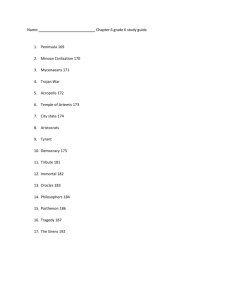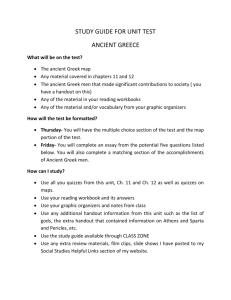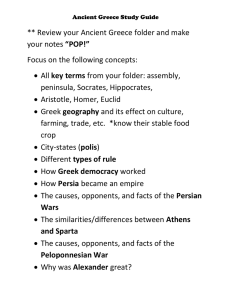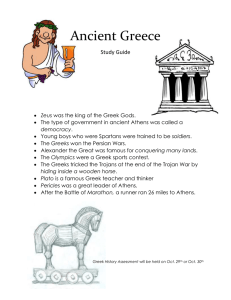Final Review Day 1
advertisement
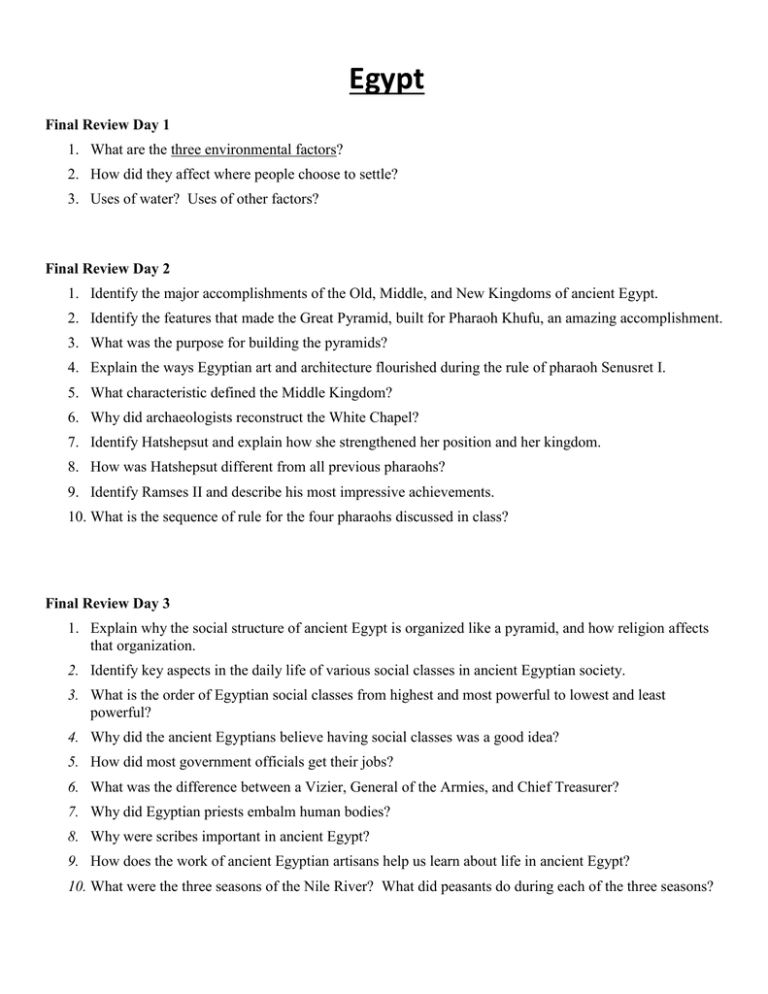
Egypt Final Review Day 1 1. What are the three environmental factors? 2. How did they affect where people choose to settle? 3. Uses of water? Uses of other factors? Final Review Day 2 1. Identify the major accomplishments of the Old, Middle, and New Kingdoms of ancient Egypt. 2. Identify the features that made the Great Pyramid, built for Pharaoh Khufu, an amazing accomplishment. 3. What was the purpose for building the pyramids? 4. Explain the ways Egyptian art and architecture flourished during the rule of pharaoh Senusret I. 5. What characteristic defined the Middle Kingdom? 6. Why did archaeologists reconstruct the White Chapel? 7. Identify Hatshepsut and explain how she strengthened her position and her kingdom. 8. How was Hatshepsut different from all previous pharaohs? 9. Identify Ramses II and describe his most impressive achievements. 10. What is the sequence of rule for the four pharaohs discussed in class? Final Review Day 3 1. Explain why the social structure of ancient Egypt is organized like a pyramid, and how religion affects that organization. 2. Identify key aspects in the daily life of various social classes in ancient Egyptian society. 3. What is the order of Egyptian social classes from highest and most powerful to lowest and least powerful? 4. Why did the ancient Egyptians believe having social classes was a good idea? 5. How did most government officials get their jobs? 6. What was the difference between a Vizier, General of the Armies, and Chief Treasurer? 7. Why did Egyptian priests embalm human bodies? 8. Why were scribes important in ancient Egypt? 9. How does the work of ancient Egyptian artisans help us learn about life in ancient Egypt? 10. What were the three seasons of the Nile River? What did peasants do during each of the three seasons? Final Review Day 1 1. What is a peninsula? 2. How did Greek mountains affect communication? 3. Why did Greek Communities sometimes fight each other? 4. What problem did ancient Greek communities try to solve by starting colonies? 5. Ancient Greeks raised sheep rather than cattle, grew olive trees rather than wheat, and lived in isolated communities rather than in a united country. What factor accounts for these qualities of Greek life? Final Review Day 2 6. How did colonies affect ancient Greek culture? 7. In what proximity is the Aegean Sea to Greece and Asia Minor? (direction to both) 8. Use a map key to answer map questions. What trade goods did Greece import? 9. What were the two factors considered by colonists in choosing a good place to set up a colony? 10.Which form of transportation was used to carry MOST trade goods? Final Review Day 3 11. How was it possible that different parts of Greece had different forms of government? 12. Which form of government in a Greek city-state usually came first? 13. How did most kings in ancient Greece come to power? 14. In a monarchy, a small group of aristocrats advised and provided supplies for the king. What became of the aristocrats when kings no longer ruled Greek city-states? 15. What trend took place under Greek oligarchies? Final Review Day 4 16. Who would have most likely would have said these words? “I was in the army when people started complaining that members of the government were getting richer and passing laws that made everyone else poorer. So I stepped forward, and with their help, I became leader.” 17. What type of government does the following list describe? “There is one ruler. The ruler usually inherited power. The ruler passed on leadership to his son.” 18. How was democracy in Athens different from other ancient forms of government? 19. How was ancient Greek democracy different from democracy in the United States? Final Review Day 5 23. What idea that is important today came from ancient Athens? 24. Which feature of Athens geography most affected its economy? 25. Which physical feature made Sparta somewhat isolated? 26. Why was the Athenian economy based on trade? 27. What is one way the Assembly of Athens differed from the Council of 500? Final Review Day 6 Chapter 27/28 28. How did the citizens of Athens get enough grain to eat? 29. What events most likely happened in the agora of Athens? 30. Are the city-states of Athens and Sparta friends or rivals? 31. Describe how a Spartan soldier fought. 32. What does this statement mean? “Spartans are not entirely free”. (In regards to battle) 33. Why did the Persians think it would be easy to conquer Greece? Final Review Day 7 / Chapter 28 34. What were the Greeks able to use to win the Battle of Salamis? 35. What do the Battle of Marathon, the Battle of Salamis, and the Battle of Thermopylae have in common? 36. What was an important result of the Persian wars? Use the timeline to answer #37-38. 37. Fill in the Battles in the appropriate order. What Battle happened after the Battle of Salamis? 38. What year did the Battle of Plataea happen? Final Review Day 8 / Chapter 29 39. Why was Pericles famous? 40. Describe public buildings in Athens. 41. Athenians lived in crowed, dirty neighborhoods, while the city was known for its beautiful buildings. Based on this information, what can you conclude about Athenians’ values? 42. One of the greatest achievements of Greek sculptors was…..? 43. If you left Athens heading west, what city would you be heading to? How about northwest? 44. What is located to the southwest? Final Review Day 9 / Chapter 29 /31 45. The word alphabet comes from? 46.What influence from ancient Greece is visible in this picture of the Lincoln Memorial in Washington, D.C.? 47. What are two kinds of Greek Drama? 48. Why was Herodutus called the “father of history”? 49. Give an example of American democracy that comes from the ancient Greeks. 50. Who is the “father of medicine”? What did he teach his students? Final Review Day 10 / Chapter 31 51. What topic did the scientist, Pythagoras and Euclid study? 52. How did Greek scientists make their most important discoveries? 53. What are lines of latitude and longitude? Where would you find them? 54. In what way are many theaters today like the ones in ancient Greece? 55. What was the purpose of the first Olympics? 56. What is one way the modern Olympics are like those of ancient Greece? 57. The word Geography comes from the Greek words meaning? Final Review Day 11 / Chapter 31 58. Name two parts of Greek architecture that contributed to modern architecture. Use the chart below to answer questions 59-62 59. What does the word “biography” mean? 60. What is the study of life? 61. What does the word “telephone” mean? 62. What word means “high city”? Final Review Day 12 / Geography 63. Which continent is south of North America? 64. Which continent is southeast of Asia? 65. Which continent is north of Africa? Which continent is south of Africa? 66. Which body of water is between North America and Europe? 66a. Which body of water is located between Africa and Europe? 67. Which body of water is east of North and South America? How about west? Final Review Day 13 / Geography 68. Which set of coordinates identifies the Absolute Location of Mombasa? 69. In which hemispheres would you find Mexico City? 70. What is the approximate distance from Mombasa to Jakarta? 71. Which set of coordinates identifies the Absolute Location of Tokyo / St. Petersburg? 72. In which hemispheres would you find Cape Town? / Santiago? 73. How many miles is it from Los Angeles to Mexico City?

